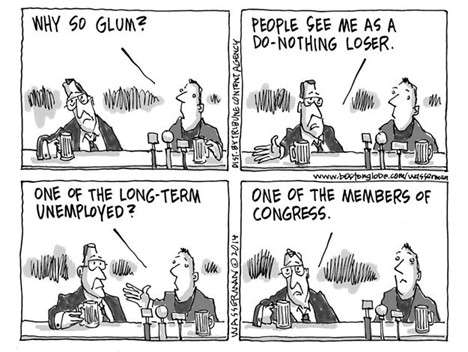
12 Apr The Congressional Handmaiden
“Congress has ceded law-making authority to the President and no longer is functioning as an independent branch of government.” – The Lonely Realist
WAKE UP CONGRESS! You are a co-equal branch of government, not an impotent captive of Presidential power. Heed Senator Rand Paul (R-KY): “I don’t care if the President is a Republican or a Democrat…. I don’t want to live where my representatives cannot speak for me and have a check and balance on power.”
The Constitution provides that the Legislative Branch of America’s government – Congress – has the Constitutional power to enact laws. If a President disagrees with a law passed by Congress, he can veto it. If Congress disagrees with that veto, Congress can override it by a super-majority. Once it becomes law, however, the Executive and Judicial Branches must follow it. Neither Congress nor the courts are subservient to the Nation’s Executive. With respect to Congress, that’s not what has been happening.
Let’s start with tariffs.
The Constitution provides that Congress and not the President “shall have Power to lay and collect Taxes, Duties, Imposts and Excises” and that “all Bills for raising Revenue shall originate in the House.” Although tariffs are “Revenues,” Trump 2.0 has claimed for himself the authority to unilaterally originate and impose tariffs, taking the position that he is authorized to do so by the International Emergency Economic Powers Act of 1977 (IEEPA) which empowers a President to declare a “national emergency” should there be “an unusual and extraordinary threat.” However, no President previously used the IEEPA to impose tariffs, and for good reason. The IEEPA states that “[t]he authorities granted to the President by this title may only be exercised to deal with an unusual and extraordinary threat.” The Trump 2.0 tariff declaration asserts that there is a “national emergency posed by the large and persistent trade deficit that is driven by the absence of reciprocity in our trade relationships and other harmful policies….” Really? That “large and persistent trade deficit” has existed for decades…, and now it’s a “national emergency” that only tariffs can remedy? A lawsuit brought this week by the conservative New Civil Liberties Alliance bitingly disagrees: “Congress passed the IEEPA to counter external emergencies, not to grant presidents a blank check to write domestic economic policy.”
Senator Chuck Grassley (R-Iowa) has a similar view, sponsoring a bill that would require Congress to approve new tariffs. Senator Grassley’s bill does not, however, address President Trump’s existing tariffs. That’s because Republican members of Congress will not affirm their Constitutional power in fear of Presidential retribution. This even though the President has exceeded his Constitutional authority as well as the authority delegated to him under the IEEPA. Furthermore, as several commentators have contended, the IEEPA itself is unConstitutional in delegating excessive legislative authority to the Executive Branch. Matt Levine has summarized it as “we all agree that the president is doing something that is both illegal and bad for the country, but we are afraid to say that publicly.” WAKE UP CONGRESS! This is your Constitutional moment! Either vote to uphold/impose the Trump 2.0 tariffs or vote to end or amend them!
Checks and balances issues also are presented by Executive Orders. For example, President Trump has used Orders to gut the U.S. Agency for International Development, the U.S. Institute of Peace, and the Department of Education (discussed here). He has similarly asserted a Presidential prerogative allowing him to ignore the Administrative Procedure Act, revoke Congressionally mandated university research grants and circumvent Federal employee protection laws. Members of Congress should be speaking out about upholding the laws that Congress itself enacted!
Congress has an additional Constitutional obligation to ensure that its laws are properly enforced. Among those laws are those making it illegal to extort money, engage in fraud, forge documents or impersonate executives, traffic in narcotics, engage in money-laundering or hack into computers, or physically assault law enforcement officers. Those were the crimes committed, respectively, by Rod Blagojevich (the former governor of Illinois), Trevor Milton (the former CEO of Nikola Corp.) (noting that Mr. Milton was pardoned by President Trump two weeks after federal prosecutors asked the judge to order him to pay >$650m in restitution and another >$15m to one of his victims), Carlos Watson (the former CEO of Ozy Media), Ross Ulbricht (who created and operated Silk Road), and Enrique Tarrio (the former leader of the Proud Boys). Each was criminally convicted of Federal felonies. Each was tried before a jury “of his peers.” Each was represented by highly capable legal counsel. And each was imprisoned pursuant to a unanimous jury verdict with unsuccessful appeals thereafter. President Trump nevertheless commuted the sentences of Mr. Blagojevich and Mr. Tarrio and pardoned the others, something the Constitution gives him the unfettered right to do. However, he subverted undermined the laws themselves, the jury system, the judges who tried the cases and the judges who heard the appeals by declaring that one of those he pardoned “was set up by a lot of bad people,” another “did nothing wrong,” the third was prosecuted by “scum [who] were some of the same lunatics involved in the modern day weaponization of government against me,” and the fourth was prosecuted because “the thing that he did wrong was he was one of the first people that supported a gentleman named Donald Trump for president.” In issuing the pardons, President Trump cited no mitigating circumstances, instead implying that the laws under which each was convicted were wrong and/or wrongly applied, the jury system did not work, and the judges involved in their cases acted improperly (the latter being reinforced by President Trump’s subsequent call for impeaching “Crooked Judges”).
President Trump’s pardons differ from those of his predecessors in both scope and rationale. Creative attorneys undoubtedly will leverage the President’s words and acts to argue that their clients have been persecuted in similar ways. After all, they will allege, their clients dealt with “bad people,” including “lunatic” prosecutors and “Crooked Judges.” Their clients also acted no worse and arguably better than those who were pardoned by the President and, they will argue, were prosecuted because of political vendettas and government “weaponization.” Further, their clients undoubtedly did “nothing wrong” since the laws themselves were wrongfully applied. These arguments will place further burdens on America’s Rule of Law. Lawyers will, as a matter of course, ask the President to pardon their clients. If those requests are denied, defendants will ask courts to sanction discovery concerning whether a quid pro quo had been negotiated in return for Presidential commutations or pardons, arguing that without a quid pro quo, Presidential pardons amount to a repudiation of the applicable laws themselves, which will open a can of worms. Congress enacted these laws. Members of Congress should speak out in their favor and support the court system that applies them.
If the President believes that laws, court systems and judges are flawed and/or corrupt, he should be asking Congress to change those laws, that court system and those judges. He should not be acting unilaterally, whether under a unitary executive theory or otherwise. After all, the President’s party has a majority in both Houses. If he’s right, his views should prevail. Were he to seek Congressional action, of course, that would indeed wake up Congress.
Finally (from a good friend)





No Comments